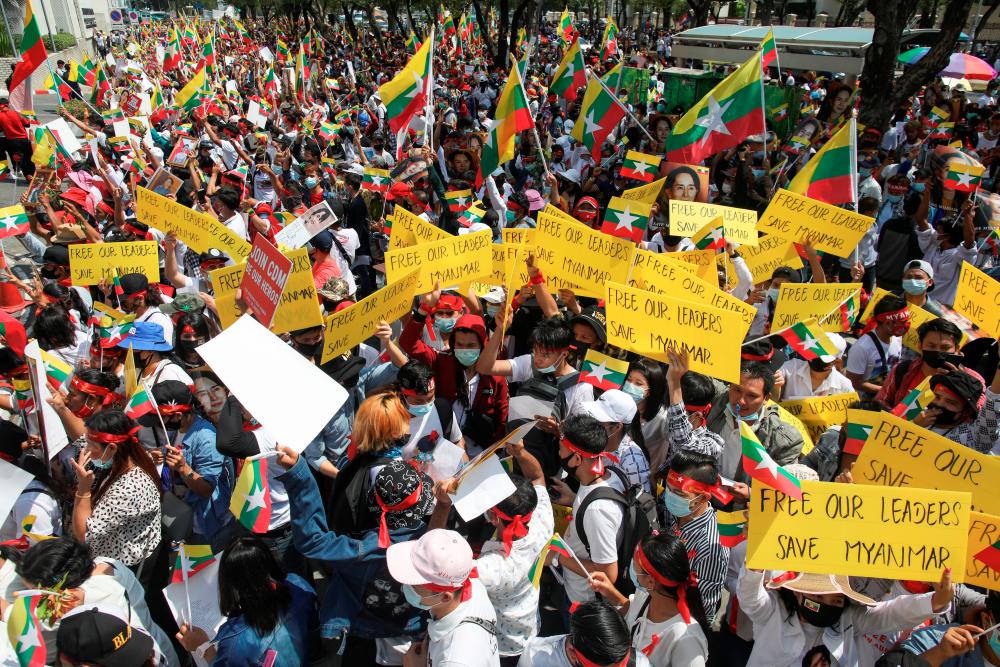By ABHINAV MEHROTRA
MYANMAR has endured 50 years of rule under military junta.
The last five years had raised hopes for a brighter future but what transpired just before Aung San Suu Kyi’s party assumed office for the second time has brought back memories of the old dark days where there was disregard for democracy and rule of law.
Democracy is about achieving balance between dissent and agreement and not zero-sum scorched earth attacks on anyone who does not follow the orthodoxy of one political group.
This attack on dissent and disagreement is the approach taken by the military junta in Myanmar and several other governments around the world that are less democratic than others.
The threat posed to the rights of individuals more specifically human rights and in a larger context the survival of the democratic structure at the international level ultimately leads to the discussion of whether there should exist a right to democracy as a human right, because the more democratic a society is, the more we see human rights being honoured and protected.
If the right to democracy is enshrined in the constitutions of countries, it would ensure a better protection of human rights, growth, development and security.
This idea of democracy is further supplemented by the views expressed by former United Nations secretary- general Boutros-Boutros Ghali, who had argued that “human rights, equal rights and government under law are important attributes of democracy”.
It cannot be emphasised enough that the human rights record of most European countries, Japan, Canada, Australia and New Zealand has received worldwide appreciation.
The common thread among these is the presence of a strong democratic political system that aims to safeguard the rights of their citizens by upholding the rule of law, respect for individual liberty, protection from oppressive state interference and defence of human rights.
Coming to Myanmar, on Feb 1, the Myanmar military, or The Tatmadaw, staged a coup d’état by detaining leaders of the ruling National League for Democracy (NLD) party and the civil leadership that included Aung San Suu Kyi as well as President U Win Myint under the garb of fraud in last year’s general election where NLD had secured a landslide victory, and under the export and import law and the natural disaster Management law. Two more charges were added later on.
These developments have received widespread condemnation from countries around the world including the EU, the US and Australia.
US President Joe Biden labelled the coup as “a direct assault on the country’s transition to democracy and the rule of law”.
Such an act of nullifying the results of the election has happened in the past. In 1990, when the first national elections were held, the NLD had won but the military disregarded the elections.
However, at that time the military was ruling the country, which was not the case in the 2021 coup, making the fresh developments even more significant.
It was only in 2010 that Myanmar’s reputation at the international level began to recover when Aung San Suu Kyi was released from house arrest and the NLD was allowed to contest elections.
As a result, the sanctions imposed on Myanmar were eased and trading relations were re-established.
To illustrate, in the period between 2012 and 2017, the foreign development aid increased from US$285 million to US$1.06 billion.
This shows the importance of a democratic structure in the growth of the country and leads us to the discussion of what are the criteria that are required to be met for the right to democracy to be recognised as a human right.
According to Beitz’s, who was a professor of politics at Princeton University, there exists three kinds of claims that are required to be met: the reasonableness of the right, absence of which would lead to atrocities against right holders by municipal level institutions and it must not result in undue burden.
One such example where the municipal authorities violated the rights of its citizens in absence of democratic structure that resulted in grave violations was the Arab Spring.
In 2011, the Egyptian government had imposed a shutdown of the internet to suppress dissenting voices of its citizens which was in direct contravention of the covenant dealing with civil and political rights.
It was the Special Representative on the Promotion of the Right to Freedom of Opinion and Expression who emphasised the gravity of the situation and urged the government to restore the freedom of expression and access to information for their citizens.
Other examples where the reasonableness and necessity of democratic structure have been proven include raising of voices against subjugation of indigenous communities in Latin America etc.
In this respect, the role of the United Nations to ensure democracy assumes significance. The United Nations has on the one hand put the idea of human rights at the forefront of the issues dealt by the international community which has given impetus to various non-governmental organisations to promote and protect human rights.
Nonetheless, the concerns regarding sovereign equality and non-intervention are something that places an obstacle in realising human rights and more so when we argue for a right to democracy as a human right, which is a direct interference in the internal affairs of a country.
From an international perspective, the United Nations needs to take up the responsibility as it has done in the past in countries like Kosovo to establish a democratic structure in Myanmar and take the lead and facilitate an international instrument that specifically deals with right to democracy as a human right.
Abhinav Mehrotra is an assistant lecturer at O.P. Jindal Global University and holds an LL.M. in International Human Rights Law from University of Leeds. Comments: letters@thesundaily.com














